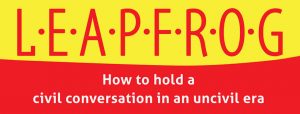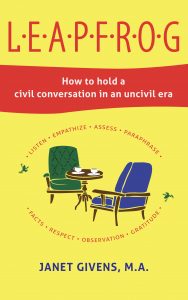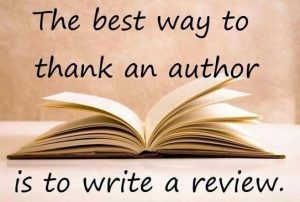
One of the benefits of self-publishing is that I can go back into my published book at any time and make it better. And, given my propensity to tweak, I have been doing that with LEAPFROG, the book that arose right here, nearly three years ago.
From among the many tweaks I’ve done these past few months, here are three excerpts from the original introduction that I loved, BUT simply no longer fit. Yes, I’m killing my darlings again.
I had expected to move this first one to the Conclusion. But, when I got there, I found there was no place to add the points contained without interruption. And, so, it falls into that category of so many of my early blog posts here and becomes a “Deleted Scene.”
My government, this unique American democracy, has long been an exciting experiment to me. Constantly striving to improve, her watchwords, until recently, have been progress and inclusion.
She has made many tragic mistakes over her nearly 250 years. The depravity of slavery, the genocide of our Native population, the blatant discrimination of each succeeding wave of immigrants, and the arrogance of interning Americans of Japanese descent during WWII are only the most well-known.
America’s history is filled with examples of the kind of “dehumanization” at the core of our current incivility.
And yet, we have grown from those mistakes. We’ve changed the laws and we’ve gotten stronger as waves of immigrants brought new blood and new ideas onto our land. This diversity is one of our greatest strengths as a country and, for many, defines who we are as Americans.
Some would say that is a liberal point of view and, wanting to be certain this booklet attracts all Americans, I turned to the cognitive linguist George Lakoff for guidance. Lakoff has written (in Moral Politics: How Liberals and Conservatives Think) of American voters as falling into two distinct metaphors of family structure: the strict, authoritarian parent (conservatives) and the nurturing parent (liberals).
According to Lakoff, discipline, obedience, and patriotism align strongly with conservative worldviews. As a result, the issues of military might, national security, and crime will be viewed differently by conservatives and liberals. Even “responsibility” gets divided, with conservatives advocating for personal responsibility and liberals, social responsibility.
Liberals push for multiculturalism and advocate for travel and new experiences (it was the Democratic presidency of John F. Kennedy that gave us the Peace Corps, for example), while conservative values of tradition, stability, and an affinity for the familiar have also woven themselves throughout our history and have helped to steady the ship of state during times of upheaval. Indeed, the mixture of conservative and liberal positions is yet one more example of the range of American diversity.
The following excerpt, though, I just cut. I am not a political science professor and needn’t try to behave as one.
In a pure monarchy, royalty rules. In a democracy, it’s the people, and merit is what counts. In an oligarchy, the wealthy decide based on how they might increase their wealth, while the rest of the citizenry are kept at bay by pitting the people against each other. Is that where we are today?
And, finally, I just cut this one.
In our current political climate, our cultural capacity for sustained discussion over serious disagreement is low. Anyone watching news shows where guests are reduced to shouting over each other can attest to this loss of civility.
I’ve updated my latest book, hopefully for the very last time. Below is the new, updated INTRODUCTION in the pull-down menu. If it calls to you, I hope you’ll use the link below that to order the paperback. This tiny manual needs to have hands on it, testing it out. And when you do, I trust you’ll ply me with your thoughts. I applaud your courage.

[learn_more caption=”INTRODUCTION”] When did we stop talking to each other?
The idea of disagreement, of difference, scares many. When I was growing up in the 1950s and ‘60s, the Emily Post books on etiquette taught that, in polite conversation, we must stay away from two topics that are central to how we see ourselves: politics and religion.
In those days, we’d have guests of divergent belief systems and opt for dinner party civility over possibly causing discomfort among our guests.
These days we no longer worry, for we tend to surround ourselves with those who think and live and vote and perhaps even worship as we do. Ideological bubbles, some call them, and we all live comfortably within their familiar borders. Politics and religion are no longer taboo, but for troubling reasons.
Concurrently, as more schools eliminate classes in civics and cancel debate teams, critical thinking and rhetoric skills suffer. Rhetoric teaches us to argue without anger; debate offers the chance to argue a position dispassionately by taking one opposite your own. Wouldn’t they be valuable skills to foster?
Today, the United States is struggling with countless issues — “God, guns, and gays” someone once alliterated. These issues are often about who gets to decide who holds the power, and how porous the boundary is that separates the “Haves” from the “Have-nots.”
The need for people of diverse views to be able to talk together has a history as long as democracy itself – back to the Greeks. Socrates taught that civil discourse was a “dialectic” — a public dialogue to uncover truth — and would resolve conflicts within a society.
Later, Cicero, the Roman orator and statesman of the first century BC, introduced the term civil society (societas civilis) and held that human beings are inherently rational and have the capacity to gather for a common cause to maintain peace. That era ended when feudalism arrived and the idea of “Just War” preoccupied political thought until the Enlightenment of the 18th century, theoretically at least.
After spending the last three years focused on this topic, I’m more convinced than ever that (1) we all benefit from ideas that challenge us and get us to think anew and, (2) no matter our political, religious, or philosophical beliefs, we can disagree without being disagreeable.
Conflict, disagreement, and misunderstanding can arise unexpectedly during the course of anyone’s day. We may get triggered, sucked into an argument we didn’t see coming, propping one set of facts up against another with neither side listening, and eventually wondering what the hell just happened.
As important as political conversations are, the ideas given here can be applied to any conversation you deem “difficult,” from marital disagreements and parent-teen clashes to neighborhood standoffs and workplace disputes. We can disagree with someone we love and still love them. And so, perhaps a more inclusive subtitle would be, How to hold a difficult conversation at a difficult time.
In any case, the first goal of the conversations I describe here is understanding. A difficult conversation need not question the other’s judgment, engage in name calling, diminish the other person’s self-worth, or resort to threats or bullying. Of equal importance, these conversations are not intended to convert or convince.
Not intended, that’s the important point. One or the other of you may wind up changing your point of view. This is not to be negated but, it is important to understand this booklet will not work if you set out thinking one of you just needs to change.
Instead, think of your disagreement as a mystery that intrigues you both. Strive together to discover just where your impasse is, why it is you disagree so vigorously. What have each of you not understood until now? If you can, think of it as an adventure you’re undertaking together; you’ll go further.
Difficult conversations grounded in curiosity, compassion, and courage, as I advocate here, are not for the faint of heart. Keep in mind, we are talking about our brothers and sisters, our uncles and aunts, our fellow citizens; people in relationships that matter to us who hold strong opinions and have needs they want met.
Gaps among our various demographic groups widen with each new poll. But I believe we will meet the challenges ahead if only if we learn to talk to one another. If we don’t start today, then when? If not you, then who?
Civil conversations are hard to find these days. Someone says to us, “We have to talk,” and we look for ways to run. But, if the idea of holding a difficult conversation for the purpose of healing our divided world seems too frightening or unrealistic at present, know that it has been done before.
I’m thinking of the negotiations in the early 1990s between the African National Congress (ANC) and South Africa’s ruling National Party, initially in secret, which led to the end of apartheid and the release of Nelson Mandela and other political prisoners.
I’m thinking of Northern Ireland, and their seemingly endless internal wars between the Protestants and Catholics, the Loyalists and the Republicans.
I’m thinking of the 50+ years of drug wars in Colombia, and the way in which two warring factions came together: FARC and ELN (google it).
I’m thinking of our own Civil War and of Lincoln’s call to find our “better angels.” Three generations later, in the 1930s and 1940s when fascism threatened to land on our shores, deep disagreements over urban-rural tension, imports and exports, electrical expansion into rural areas, and soil erosion led to a New Deal program that gave rise to USDA programs we still have. Do you know how? Urban politicians went to rural farms across the Midwest and listened to them.
When people are given the opportunity to be heard without judgment, magic happens. Given the ability to freely posit a confident opinion and the experience of being involved in an important conversation, I believe people will find each other again.
If it is our desire to live in a civil society, a good society, we must be willing to engage in a dialogue with those with whom we disagree. This is the premise with which I begin. But how do we do that? Particularly when the likelihood is high that it will go awry?
LEAPFROG, an acronym comprised of four verbs and four nouns, grew from my notes on civil discourse that my colleague Jeff Kay and I presented to a local League of Women Voters group in early 2017. Those notes became a series of ten posts on my weekly blog, And So It Goes. In short order, my readers convinced me they should be gathered into a book for wider distribution. Here we are, three years later.
The verbs are Listen, Empathize, Assess, and Paraphrase. Together, they help us as we listen to the other person. The four nouns — Facts (Forget them for now), Respect, Observation, and Gratitude — guide us as we present our ideas in a way that will increase the likelihood that we will also be heard. Yes, it’s all about listening and being heard.
I present these eight elements linearly only to form an easily remembered acronym. Feel free to leap, jump, or bounce around, taking turns and repeating the elements as your conversation continues, leapfrog fashion, back and forth, taking you deeper into understanding, appreciation, and, ideally, connection.
At the end of each chapter, I’ll present questions for you to consider. I hope you’ll take the time to reflect on them before you move on.
For this introduction, I want to honor the fact that there are cultural as well as individual differences in how we deal with conflict. To that end, please consider these questions before proceeding:
• How were disagreements managed in your childhood home? How did your family get news? How were current events discussed?
• How have those early rules changed as you’ve matured? Are any subjects “off the table” automatically? How must someone behave for you to engage with them in a debate? How do you talk about current events with people who disagree with you?
I also hope you’ll take advantage of the resources I’ve collected as I put this booklet together. You’ll find them at the end of each chapter plus a broader list at the end of the book. The links are live in the eBook version and on the LEARN MORE page of my website, janetgivens.com
Resources used in putting my initial LEAPFROG acronym together:
Teaching Tolerance: A Project of the Southern Poverty Law Center, more specifically their blog post, Toward a More Civil Discourse, April 2016.
National Institute for Civil Discourse at the University of Arizona
The Scheinman Institute on Conflict Resolution at Cornell University
Holly Weeks. Failure to Communicate: How Conversations Go Wrong and What You Can Do to Right Them. Harvard Business Review Press. 2010 [/learn_more]
And remember . . .

How about you? What keeps you from holding one of these conversations?
[box] LEAPFROG, my tiny handbook for handling those tricky conversations we all face, is now available in digital and paperback format.

I’m participating in Amazon Affiliates, so your purchase through my website will enable me to make a wee bit more and not increase your cost at all. The above link takes you to the LEAPFROG page on my website (not yet accessible directly) where you can learn more about the book. To skip that page and go directly to the book’s page on Amazon, click here. Thank you.
[/box]
Ally Bean
How about you? What keeps you from holding one of these conversations?
Quite simply, no one I know is interested in hearing what I have to say. I am not on TV so what could I possible know about politics? Cable news, regardless of editorial slant, is all that matters. Friends, family, neighbors, co-workers are just window dressing in your life, not as important as following the dictates of what is on the screen– she says cynically.
Ally Bean recently posted…In Which I Answer 20 Questions Because It’s Something Fun To Do
Janet Givens
You raise such an important point, Ally. How to start, how to find that curiosity that motivated us to inquire, how to offset the inevitable cynicism that creeps in and sets up shop? Seems you’ve raised three important points. Thanks. (I answer one in the book).
Janet Givens recently posted…LEAPFROG Outtakes
Marian Beaman
I am and always have been in favor of honest discussions where opposing viewpoints are aired in a civil manner. And, then negotiation and compromise if needed to move forward.
In my former life, I was in charge of training in our college’s cooperative learning initiative enable by a FIPSE grant. Oh, if these simple (but not easy) lessons to disagree agreeably could be learned.
On another note: I have purchased LEAPFROG but have not yet read it. One goal for this spring is to read/review it. Yes, I know how important reviews are to authors!
Marian Beaman recently posted…80-Year-Old Publishes Steamy Saga
Janet Givens
FIPSE? That’s a new one to me. Thank you for buying the book, Marian. I hope you’ll read it slowly, chewing a bit on the various questions and checking out the various resources listed at the end of each chapter. Particularly that YouTube video I’ve added at the end of Ch. 1. I think I’m ultimately talking about fear, the fear that keeps us from moving forward, moving into necessary but difficult conversations, fear of the unknown. Our amygdala can get hijacked so very easily. That’s certainly true for me.
That’s certainly true for me.
Janet Givens recently posted…LEAPFROG Outtakes
Marian Beaman
FIPSE = Federal Initiative for Post-Secondary Education
Janet Morrison
Janet, I agree with everything you wrote in this blog post. I’m sorry you felt like you needed to “kill some of your darlings.” You’ve made many good points, and your writing style pulls me right in.
Janet Givens
Thanks so very much Janet. That means a lot.
Janet Givens recently posted…LEAPFROG Outtakes